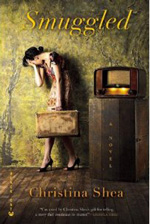
This is a story about getting lost and being found. It begins in the perfect time and place for a tale of identity stolen, transformed and rediscovered: 1943, in the midst of the Holocaust. You might think you can imagine what comes next, but that's unlikely. The story is surprising yet realistic, one that has not been told often enough. What happened to the Holocaust survivors who ended up trapped behind the Iron Curtain, those who were subsequently enslaved by their liberators in the new prison of Communism?
Éva's story is one answer. A Hungarian child, she is smuggled in a flour sack over the border into Romania. She is dark-skinned, crippled, suspicious on so many levels. She might be a Jew or a Gypsy, but in any case she's hardly safe in a world dominated by Nazis. The gruff aunt and uncle who take her in are well paid, and they make sincere if insensitive efforts to save this illegitimate niece who is a stranger to them. They force her to take a new name, make her hide her face and her disfigured hand, insist that she suppress the only language she knows, and eventually purchase forged papers that prove she is Anca, a Romanian by birth. At all times, she must avoid attracting attention. But this was never Éva's way.
The child is confused. Where is her mother? What strange, foreign words are these that Aunt and Uncle speak, and what do they mean? Why can't she go home, and why do they insist on calling her Anca, a name "like glass breaking"? Perhaps her willfulness has caused her mother to send her away. She tries to become more cooperative, to behave as her relatives demand, and although her efforts do not bring her mother back, they do work a subtle change in the child. As time goes by, she remembers Éva and her mother, their neighbors and their lives in Hungary only vaguely, as one remembers a fairy tale heard at bedtime in childhood. She is a changeling, this Anca, and her greatest fear is discovery. Nonetheless, a rebellious spirit just below the surface can't resist bubbling up from time to time. Then Anca speaks her mind, resists what she despises. For that, she will be punished again and again, but never enough to break her. Éva is stronger than even Anca knows.
The story follows Anca through WWII, liberation, Communism, and liberation again. She becomes an adult, knows love, tragedy and fear, always hiding what she is afraid to admit even to herself: she had another life, another self, another heritage, another family, another country, and some day all this may be discovered. Then what?
Christina Shea's often painful chronicle is conveyed in beautifully sculpted language, alive with vivid prose and intricately layered metaphor. Anca and those who share her fate encounter obstacle after obstacle as they struggle to live simple human lives in the midst of ongoing political upheaval. But what might be a grim tale rises above its brutal context on delicate wings. Éva's indomitable spirit provides the message of hope that gives this honest account the sheen of magic every story needs.
When I had finished reading the book, I had the urge to press it on someone else. It is a book to love and to share. Pass it on.

Grove Press, paperback, 9780802170866
